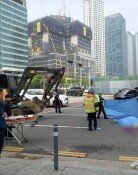KOSPI tops 2,100, but with little signs of economic recovery
KOSPI tops 2,100, but with little signs of economic recovery
Posted April. 15, 2015 15:24,
The KOSPI topped 2,100 for the first time in three years and eight months. The main stock index closed at 2,111.72 on Tuesday, posting the highest figure since May 2, 2011 (when it closed at 2,228.96). The main contributor was ample cash flow in the markets and Samsung Electronics better-than-expected first quarter earnings.
When stock markets gain vitality, domestic demand including consumption are boosted to energize the overall economy. Major stock markets including the U.S., China and Japans had been on a rally due to worldwide low interest rates and massive quantitative easing in advanced countries. However, Koreas stock markets had remained sluggish. The Bank of Korea recently cut its benchmark interest rate to a record-low 1.75 percent, while companies are expanding dividends following the governments taxation on their cash reserves, which have worked to boost the stock market.
Nevertheless, its all castle in the air if the economic fundamentals dont support. The KOSPI surged by around 200 points since the start of the year, raising concerns of a bubble formation. Some say this is an overshooting given the floating cash due to low interest rates. Under these circumstances, individuals should not borrow money for speculative investments. The Federal Reserve could begin rake hikes in the second half of this year, which could have huge spillover effects on the Korean stock market.
The real economy remains in the doldrums. Exports and domestic investment show no signs of reviving. The Bank of Korea recently downward revised Koreas GDP growth forecast from 3.4 percent to 3.1 percent, and both domestic and foreign institutions including the International Monetary Fund, Morgan Stanley and LG Economic Research Institute all lowered their Korean economic forecasts. The weakening Japanese yen and slowing Chinese growth are hampering Koreas exports, while companies are hesitant to increase investment due to uncertain conditions both at home and from abroad.
The so-called Sung Wan-jong list is sending what it appears to be a barrage of challenges to the incumbent Park Geun-hye administration, raising concerns that the government and political sector would not be able to function properly. Former chairman of Keangnam Enterprises, Sung killed himself after he allegedly bribed politicians whose list was found in his pocket that included Park`s aides and other politicians. It would incur huge loss to the nation if lawmakers are mired in political bribery scandal and fail to work on the basic service sector development law, private investment law and national fiscal law, which have to be handled at the provisional session of the National Assembly in April. Also pending are the civil servants pension and labor market reforms. Reform efforts should continue to keep the stock market momentum to connect to reviving the economy. Corruptions should be strictly investigated but more important is to keep the nation moving towards recovering the economy.






